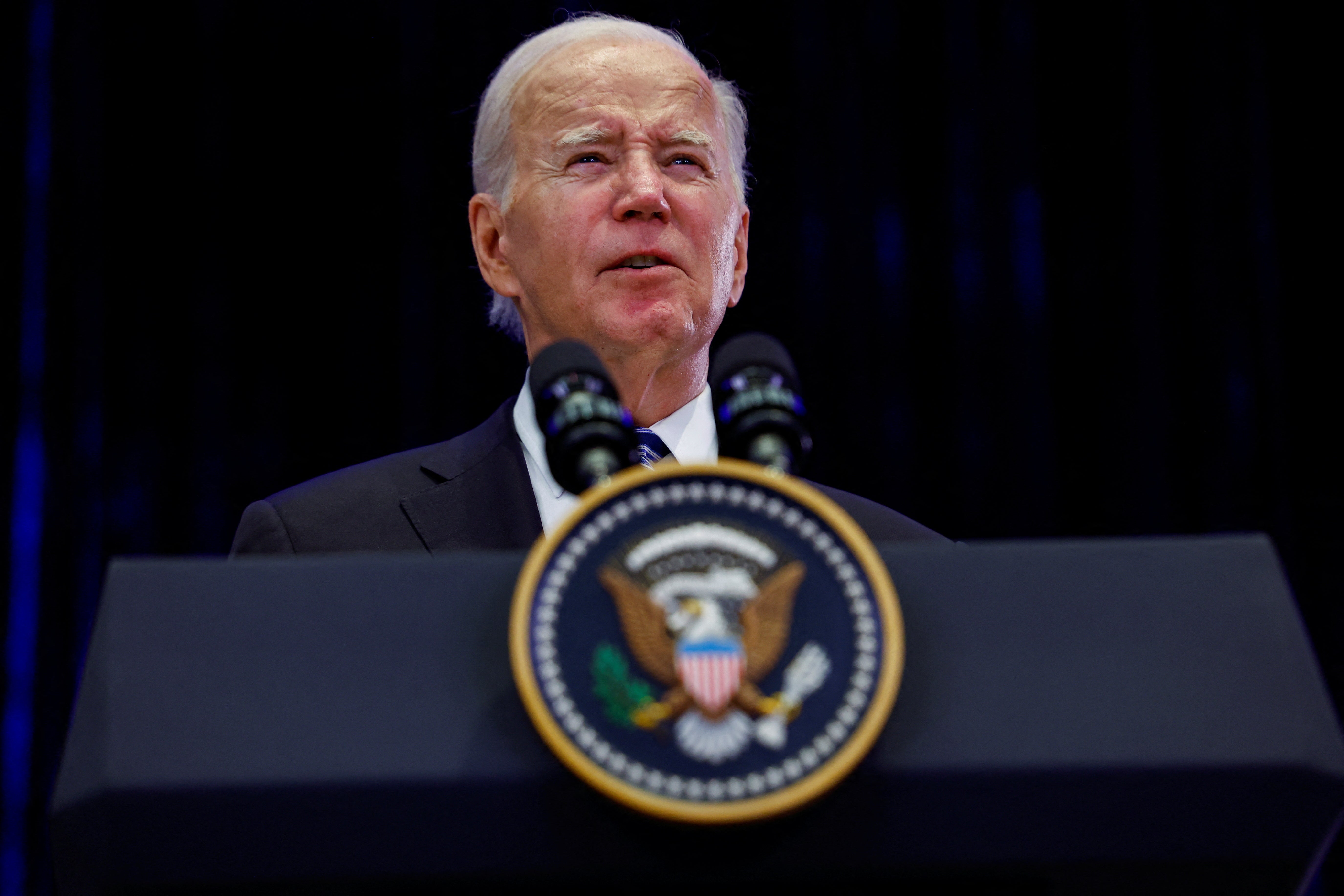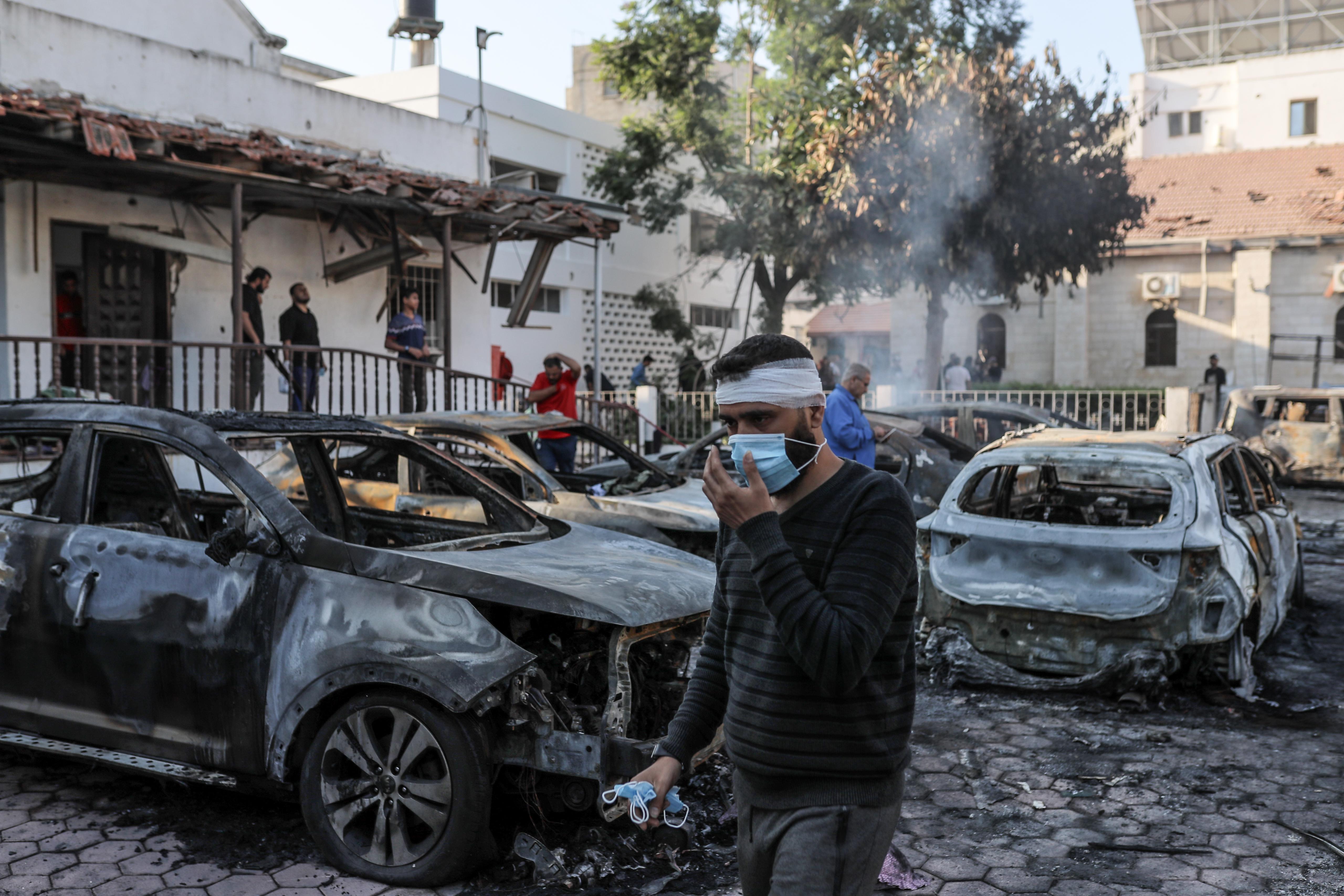Biden has a tough road ahead if he wants to keep Israel’s war from widening
The deadly blast at a hospital in Gaza has sparked anger across the Middle East and led to the cancellation of a meeting between the US president and King Abdullah of Jordan, the president of Egypt and the Palestinian president. It is an important chance missed, writes Kim Sengupta


The strike on Al Ahli hospital in Gaza City with a feared death toll of hundreds – many of them women, children and the elderly – was carnage on a scale shocking even by the lethal tallies of the Gaza wars.
It came at a critical time, with Joe Biden flying into the region to try and stop this conflict from getting out of control, and the explosion raises significant obstacles to that taking place swiftly.
The news of the strike on the hospital, with initial reports of at least 500 dead led to anger and widespread condemnation in the region and beyond.
The Israeli military announced, after five hours, that the deaths were due to a rocket fired by Palestinian Islamic Jihad which had fallen short onto the hospital car park. This was followed later with supporting imagery which also purported to show that craters and structural damage from an Israeli missile were not present. An intercepted conversation allegedly between two Islamic Jihad fighters was produced to enforce the narrative of misfire.

Both the main militant groups in Gaza – Hamas and Islamic Jihad – refuted the Israeli claims. The Gaza Health Ministry has now said 471 people had died and 314 were wounded in the blast. It is a number disputed as inflated by Israel, without offering their own total.
The blame game continued, but the key part of Mr Biden’s visit to the region, a meeting in Jordan with King Abdullah, President Abdul Fattah al-Sisi of Egypt, and the Palestinian leader Mahmoud Abbas was cancelled. The Jordanian foreign minister, Ayman Safadi, said the summit would be held only “when the decision to stop the war and put an end to the massacres” was taken.
The US president met Benjamin Netanyahu and his cabinet in Tel Aviv on Wednesday and told the Israeli prime minister in front of the media: “It appears as though it has been done by the other team, not you. But there’s a lot of people out there not sure, so we’ve got to overcome a lot of things.”
The cancellation of the Amman meeting means that an American plan involving aid for Gaza, allowing some from the territory into Egypt, the possible freeing of Israeli hostages by Hamas, and a tentative long-term plan for Gaza could not be properly pursued.
Biden announced that an agreement had been reached with Israel to move aid into the territory from Egypt. Much of that, however, has been stuck at the border with Gaza in recent days. The basis for a longer-term aid plan, linked to an eventual ceasefire, could have come from from the summit, say diplomats.
That meeting could still take place, but “overcoming a lot of things” as Biden put it, would mean overcoming the stance taken by the Arab states which backed the claim that the killings were from an Israeli air strike and not self-inflicted by the Palestinians.
Condemnation of Israel for the attack came from the United Arab Emirates and Bahrain, two countries which have established ties with the Abraham Accords of 2020, from Morocco, which recognised Israel in the same year, and Egypt which, in 1979, was the first Arab country to normalise relations with Tel Aviv.
Saudi Arabia, with which Israel is eager to establish strong relations, called the hospital blast “a heinous crime committed by the Israeli occupation forces”. The Organisation of Islamic Cooperation (OIC) described what happened as “a war crime, a crime against humanity, and organised state terrorism”.
The Biden administration had started off being unequivocal in its support for Israel following the Hamas assault 10 days ago which led to 1,400 deaths and 200 captives being taken back to Gaza. It appeared to indicate that the high number of casualties and large-scale destruction which would result from Israeli attacks would be acceptable because of what had happened.
But there have been subtle changes to the rhetoric since then. President Biden had warned of the difficulties Israel would face if it returned to a full occupation of Gaza. American officials have started saying that collective punishment for Palestinians for the sins of Hamas is wrong. The focus on helping the population of Gaza was highlighted by the appointment of David Satterfield, a veteran diplomat with knowledge of Arab states, as a special envoy on humanitarian issues.
One reason for this change, according to diplomatic sources, has been the reaction on the “Arab Street” to the US backing for Israeli air strikes and siege of Gaza. The chant “death to America” has been heard after a long while in protest marches, including in Bahrain, a close ally where the US has one of its main naval bases in the region.

There are now indications that the Israeli government would welcome attempts at diplomatic – and strategic – gains which may lessen the need for a war which would last for a long time. And would be followed by having to administer a destroyed Gaza.
The Israeli government declared war in the aftermath of the Hamas atrocities, with the military saying it is preparing to attack by land, sea and air to destroy Hamas. In the last few days, however, officers from the Israeli Defence Forces (IDF) have been telling the media that a full-scale ground war may not take place after all: there are other ways of beating Hamas.
There may well be more than one reason for this. Broadcasting operational plans to the enemy is not normally considered good military practice. And there is some evidence that Israeli forces are not ready right now to undertake such a huge mission.
But, also, the attempts to row back on full war began as news came of the Biden visit and his meeting with Arab leaders. The US president would be able to wring decisions from them it was thought, with suitable monetary encouragement, which would be favourable to Israel.
There is the shadow of another regional state, Iran, over this crisis. Iran backs Hamas and also Hezbollah in Lebanon. There have been claims that the Iranians were complicit in the Hamas raid. But no demonstrative evidence of this has been provided and Israeli military and intelligence services say they are not aware of any direct links.
The Iranians, as to be expected, have been loudly denouncing Israel in this conflict, threatening that an “axis of resistance” will open on “multiple fronts” for Israel.
However, the most obvious front, the one with Lebanon, has remained relatively quiet. There have been incursions by gunmen into Israel, resulting in them being shot dead. But they could well have been from Palestinian groups allowed by Hezbollah to go forward. Hezbollah themselves have not mobilised their reserves, or cleared border villages and south Beirut, as they would be expected to do in preparing for war.
That may change if Palestinian deaths continue to rise in such an appalling rate and a bloody ground war gets underway. Israel may then find itself fighting a war on two fronts, one with a formidable enemy in Hezbollah, which will need substantial American military aid. An outbreak of fighting in that area close to Syria risks the spread of more combustible instability.
It is becoming increasingly clear, say concerned diplomats, that the current state of ferocious violence is unlikely to end without the help of neighbouring states. And for that, President Biden’s Arab diplomatic campaign needs to get back on track.






Join our commenting forum
Join thought-provoking conversations, follow other Independent readers and see their replies
Comments